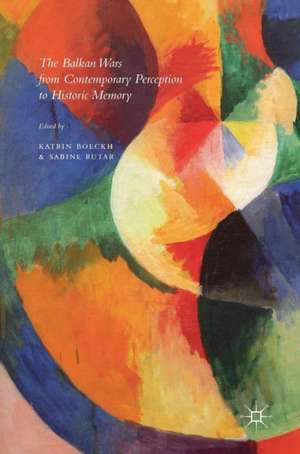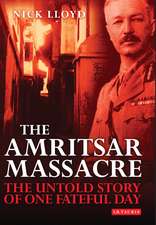The Balkan Wars from Contemporary Perception to Historic Memory
Editat de Katrin Boeckh, Sabine Rutaren Limba Engleză Hardback – 18 ian 2017
| Toate formatele și edițiile | Preț | Express |
|---|---|---|
| Paperback (1) | 697.65 lei 6-8 săpt. | |
| Springer International Publishing – 15 iul 2018 | 697.65 lei 6-8 săpt. | |
| Hardback (1) | 702.05 lei 6-8 săpt. | |
| Springer International Publishing – 18 ian 2017 | 702.05 lei 6-8 săpt. |
Preț: 702.05 lei
Preț vechi: 825.94 lei
-15% Nou
Puncte Express: 1053
Preț estimativ în valută:
134.33€ • 140.63$ • 111.15£
134.33€ • 140.63$ • 111.15£
Carte tipărită la comandă
Livrare economică 05-19 aprilie
Preluare comenzi: 021 569.72.76
Specificații
ISBN-13: 9783319446417
ISBN-10: 331944641X
Pagini: 378
Ilustrații: XVII, 350 p. 2 illus.
Dimensiuni: 148 x 210 x 26 mm
Greutate: 0.56 kg
Ediția:1st ed. 2016
Editura: Springer International Publishing
Colecția Palgrave Macmillan
Locul publicării:Cham, Switzerland
ISBN-10: 331944641X
Pagini: 378
Ilustrații: XVII, 350 p. 2 illus.
Dimensiuni: 148 x 210 x 26 mm
Greutate: 0.56 kg
Ediția:1st ed. 2016
Editura: Springer International Publishing
Colecția Palgrave Macmillan
Locul publicării:Cham, Switzerland
Cuprins
Introduction.- 1 Katrin Boeckh and Sabine Rutar, The Balkan Wars from Perception to Remembrance.- Part I: War in the Balkans – Towards the End of Empire.- 2 Fikret Adanır, Ethnonationalism, Irredentism, and Empire.- 3 Edvin Pezo, Violence, Forced Migration, and Population Policies during and after the Balkan Wars (1912–14).- 4 Daut Dauti, Gjergj Fishta, the “Albanian Homer”, and Edith Durham, the “Albanian Mountain Queen”. Observers of Albania’s Road to Statehood.- 5 Katrin Boeckh, The Rebirth of Pan-Slavism in the Russian Empire, 1912–13.- Part II: European Eyes on the Balkans – Reassuring the Self.- 6 Nicolas Pitsos, Marianne Staring at the Balkans on Fire. French Views and Perceptions of the 1912–13 Conflicts.- 7 Florian Keisinger, The Irish Question and the Balkan Crisis.- 8 Stjepan Matković, Political Narratives in Croatia inthe Face of War in the Balkans.- 9 Günther Sandner, Deviationist Perceptions of the Balkan Wars. Leon Trotsky and Otto Neurath.- Part III: Memories of Victory and Defeat – Constructing the Nation.- 10 Svetlozar Eldarov & Bisser Petrov, Bulgarian Historiography on the Balkan Wars 1912–13.- 11 Stefan Rohdewald, Religious Wars? Southern Slavs’ Orthodox Memory of the Balkan and World Wars.- 12 Dubravka Stojanović, The Balkan Wars in Serbian History Textbooks (1920–2013).- 13 Petar Todorov, From Bucharest 1913 to Bucharest 2008. The Image of the Balkan Wars in Macedonian Historiography and Public Discourse.- 14 Eugene Michail, The Balkan Wars in Western Historiography, 1912–2012.- Index
Notă biografică
Katrin Boeckh is Extraordinary Professor for the History of Eastern and Southeastern Europe at Ludwig-Maximilians University in Munich, Germany and Senior Research Associate at the Institute for East and Southeast European Studies in Regensburg. She is the author of various monographs on the history of the Balkan Wars, Serbia and Ukraine, and co-editor of several volumes on religions, political institutions and historical path dependencies in Eastern Europe.
Sabine Rutar is Senior Research Associate at the Institute for East and Southeast European Studies in Regensburg, Germany and Editor-in-Chief of the multidisciplinary social science quarterly Südosteuropa. Journal of Politics and Society. She specializes in labour history, the history of twentieth-century warfare, and the history of both early socialism and state socialism.
Textul de pe ultima copertă
This book explores the historial role of the Balkan Wars. In Eastern Europe, the two Balkan Wars of 1912/13 had greater importance than the First World War for the construction of nations and states. This volume shows how these “short” wars profoundly changed the sociopolitical situation in the Balkans, with consequences that are still felt today. More than one hundred years later, the successors of the belligerent states in Southeastern Europe memorialize the wars as heroic highlights of their respective pasts. Furthermore, the metaphor that the Balkans were Europe’s “powder keg”, perpetuated at the beginning of the twentieth century in the face of these wars, was reactivated in both the West and the East up through the Yugoslav wars of the 1990s. The authors entangle the hitherto exclusive national master narratives and analyse them cogently and trenchantly for an international readership. They make an indispensable contribution to the proper integration of the Balkan Wars into the European historical memory of twentieth-century warfare.
Caracteristici
Integrates the historiographies of the states that fought in the Balkan Wars through international contributors Furthers our understanding of twentieth-century warfare in Europe by focusing on two neglected wars Broadens our knowledge of the history of conflicts in twentieth-century Southeastern Europe














